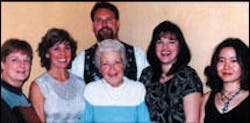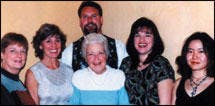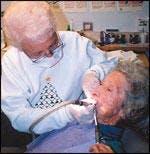Time flies when you're having fun
Meet Marian, an 81-year old hygienist who's still charming, educating, and treating patients with her 1941 license on the wall. Some patients don't even know what it's like to be treated by someone else.
by Anne Guignon, RDH, MPH
Time is a funny thing. It means different things to each of us. Time always seems to elude me. I have a hard time understanding the real essence of time, and it is hard for me to appreciate such concepts as age. Perhaps my relationship with my grandmother and mother are responsible for my difficulties in judging measures of time.
When I was in grade school, my grandmother enrolled in college. She graduated on June 5, 1963, at age 68. It was the same day I graduated from the eighth grade. She started graduate school the next year, and, when I entered college in 1967, my grandmother secretly worried that I would be embarrassed to encounter her in the university's hallways.
In 1988, she walked across the stage to receive her master's degree. She was 93 years old. Everyone in the auditorium gave her a standing ovation. One week later, I also received my master's degree. I hoped my grandmother would be able to attend, but she had already made other plans.
When my Mother turned 70, she decided to retire, announcing that she was moving to Paris for a year. She didn't mean the towns of Paris in Texas or Tennessee. She meant the City of Lights, Paris, France. That was nearly six years ago. She really didn't retire. She lives on the Left Bank and still does consulting with an American engineering firm. Perhaps it is my challenge to understand the concepts of time and age.
By now, you may be wondering what does my family history have to do with an article in RDH? Just prior to my trip to Kansas City for my 30th college reunion, Mark Hartley, the editor of RDH, sent me an e-mail. He had heard about an 80-year-old hygienist in Seattle who was still practicing. Mark and I have had many conversations about the importance of career satisfaction and all of the problems with burnout in dental hygiene. He thought an article about this hygienist, who was obviously not burned out, might be interesting.
The idea intrigued me. So I made a series of phone calls and found out that her name was Marian Frazier. I dialed her office phone number. Since Seattle is two time zones to the west of Houston, I left a message on the office recorder. I stated the nature of my business and asked that she contact me.
Several weeks went by with no response. I called the office back during their regular business hours, but she was not in that day. I explained why it was important that I reach her and asked if they would give her my message. Marian phoned me the following day. Yes, she had received my initial message, but she was not sure if she wanted to talk to me. She didn't think she had done anything special.
I disagreed. Anyone who has spent six decades in our profession and all but four years in one dental practice has accomplished something!
Suddenly, I felt like a little kid. I was interviewing a hygienist who had been practicing twice as long as I had. It is a delight to share her story with you.
When I was invited to give a continuing education program in the Seattle area, I knew that I could meet this extraordinary hygienist. So my trip was planned to allow ample time for meeting Marian in person. It was a typical drizzly Seattle afternoon when I drove into the parking garage of Virginia Mason Hospital. Dr. Ken Burnett's office entrance looked remarkably similar to many other offices housed in high-rise buildings.
I had arrived in time to see her in action. The receptionist ushered me down the hall to her treatment room. Suddenly, I was face to face with Marian. On the wall was her framed license — license number 125 issued in 1941.
She was wearing a white sweater decorated with a Christmas tree and her beautiful white hair was neatly coifed in a French twist, and, no, she had not given into scrubs! She was busy treating a wonderful German woman, polishing and flossing every tooth meticulously. Her patient willingly posed as I snapped some photos during her appointment.
Marian and I bantered back and forth at the end of the appointment, just like two old friends. I showed her how to curl a bridge threader and how to configure a saliva ejector ergonomically. As Marian was collecting her patient's coat, the German lady told me that she wanted to request Marian for all of her hygiene visits. I assured her that would not be a problem.
Marian and I headed for the garage after agreeing to continue the conversation over dinner at a restaurant near her home in Bellevue. While I was retrieving my car, Marian waited on the first floor and struck up a conversation with the attendant. This man had been a patient of hers for years. He beamed when I told him about the article, and he made Marian promise that he would get to read it.
One thing I found out years ago is that hygienists who love hygiene really love people. Once Marian and I began to talk about dental hygiene, I felt like I was talking to someone I had known for years. Our thoughts about hygiene were so similar and our love for the profession was so intense that anyone hearing us chat away would have thought we had been friends for forever. As Marian shared some of her thoughts about dental hygiene, I was struck by her professionalism. For example, she feels that it is important not to cancel a full day of patients. She is also very concerned about taking adequate time to treat patients. Obviously, you would not get short changed sitting in her treatment room.
Marian Frazier thought she wanted to be a nurse. She spent a year studying nursing but decided that profession was not for her since she could not stay awake at night. At that time Marian lived forty miles from Minneapolis in Buffalo, Minn., where her cousin practiced dentistry. He convinced her to try dental hygiene. She followed his suggestion, and, after graduating from the University of Minnesota in 1941, she practiced dental hygiene with him for two years.
In 1943, Frazier planned to visit a dental hygiene friend in Bremerton, Wash., on her vacation. The two hygienists decided to take the Oregon state board exam during her visit. Marian's recollections tell of an amazing exam. She recalls wearing a miner's light for illumination and using a foot treadle to activate the belt driving the slow-speed handpiece so she could polish. The exam was not the turning point in this trip.
After they completed the exam, Marian and her friend boarded the train in Portland anxious to return to the Seattle area. On the ride back, the two women began to converse with a couple of young Army lieutenants, traveling from Santa Barbara to their new assignment in Alaska. Marian became engaged to one of these young men on April Fool's day and got married in one year later in April 1944 — a marriage that lasted 56 years.
Early in an interview, it is important to get background information; I was yearning to learn the secrets of a hygienist who had spent 60 years practicing hygiene. At times this, became an arduous task. Marian's Norwegian heritage and Minnesota upbringing valued hard work and being plainspoken, not bragging to the world about your accomplishments or being a bother to other people. However, when I asked Marian what was the best thing about being a hygienist, she immediately spoke up: "I'm really a people person. They need my help and I tell them [the patients], 'You might as well take them with you!'" She followed this comment with her personal view of being an octogenarian: "I don't know why this age gives you the privilege to say what's on your mind ... all of those things you wouldn't have said 20 years ago."
At that moment I knew that I had met a woman of substance, someone who still had a passion for life and a passion for dental hygiene. Marian didn't think that she had done anything special, but I knew that she was a very special hygienist and was determined to learn more from her.
We continued our conversation. Marian had always practiced part-time. She had three children in seven years. Her youngest child, Jan, is a hygienist in Phoenix. When I spoke with Jan about her mother's influence on her career she said that her mother taught her a very strong work ethic, something that Jan feels is missing in many people today. Marian's husband, Stan, always supported her two careers — raising a family and practicing dental hygiene. The family vacations were always planned to accommodate her professional schedule. Although Marian celebrated her 81st birthday in January, she says she has never felt that old!
The longer we talked the more apparent it became that Marian was not your normal hygienist. Not only had she practiced for 60 years, but also 56 of these years had been in the same Seattle dental practice. Marian had treated six decades of patients for three consecutive dentists in the same dental practice, housed within a hospital.
No, this is not a hospital-based practice but rather a private dental practice that has offices in a hospital facility. The practice was originally located in this facility as a convenience. About half of the patients are not affiliated with the medical complex at all. Many are employees of Boeing, and many are fourth-generation patients of Frazier. She has seen them born and she has seen them grow up.
For years, she worked on Wednesday and Thursday, but five years ago she cut back to one day a week. There are three reasons she is still working: "It gives me a reason to get up in the morning, a reason to do my hair, and a reason to keep my weight down." Her dental hygiene career is more important than ever since she lost her husband to heart disease last year.
Even though she wears her hair up in a French twist, she confesses that she occasionally misses being able to wear her dental hygiene cap since it often saved her from the inevitable "bad hair day" years ago. Marian continues the tradition of wearing white. She has never worn scrubs but is considering purchasing her first pair. The dental office personnel must follow the hospital dress code. Doctors are required to wear white. Other personnel must wear white pants or skirts.
Whenever hygienists get together, they inevitably discuss clinical practice. Marian has a full hour to treat all of her regular patients. More time is allowed for new patients so there is sufficient time for a full set of X-rays in addition to developing a good rapport.
These days, Marian enters all of her treatment notes into a computer. There are very few hygienists today who were not trained to use power-driven scalers in school. Marian practiced for more than 25 years with only hand scalers but soon learned to master the new technology.
She summed up her feelings about ultrasonics this way: "I thoroughly enjoy using ultrasonics. There are places if you did not have ultrasonics you wouldn't know what to do — places where you need it badly."
As the evening progressed, Marian shared some of her non-hygiene stories. The most memorable involved the recent sale of her 1965 Buick Skylark convertible. She made sure that I knew that her car was in mint condition and still had its original sea-foam green paint. After dropping Marian off at her home, I drove over the bridge to Seattle and imagined Marian driving over the same bridge in her convertible — an image that was both comforting and amusing.
Several days later, Marian attended my continuing education program. I was honored to have her in the audience and even more thrilled to join Marian and her co-worker, Bonnie Gilchrist, RDH, a hygienist since 1965, during the lunch break. Bonnie shared the details of an incident that occurred when Marian was out of the office on a surgery leave. One of Marian's "regulars," a sixty-something woman, ended up on Bonnie's schedule and promptly announced, "I haven't had anyone else since I was 17 years old. I guess I'll try something different." Bonnie was smiling as she recounted the episode, obviously understanding the amazing relationship that Marian had developed with this woman for more than four decades.
As the lunch hour was coming to a close, Marian told me how much she was enjoying my program. I was touched by her analysis of today's dental hygiene. "I am just sorry that I am on my way out, instead of just starting, because there are so many new things out there." This is the essence of Marian Frazier, a hygienist in love with life and in love with our profession.
Anne Nugent Guignon, RDH, MPH, practices clinical dental hygiene in Houston, Texas. She writes, speaks, and presents continuing-education courses on ergonomics and advanced ultrasonic instrumentation through her company, ErgoSonics (www.ergosonics.com). She can be reached by phone at (713) 974-4540 or by e-mail at [email protected].


